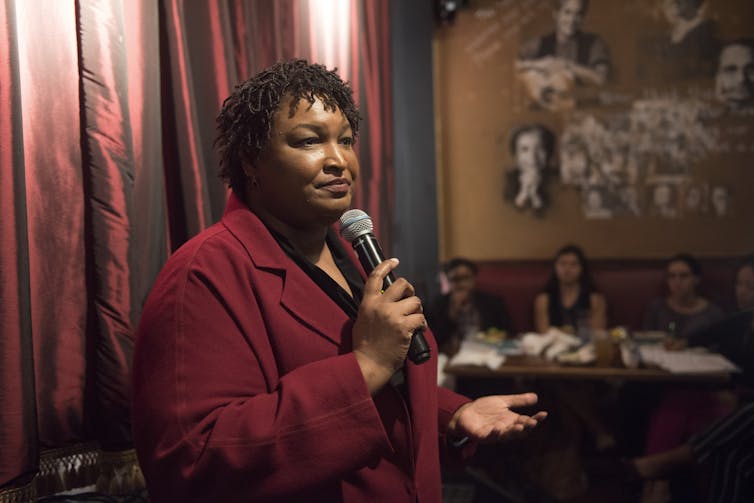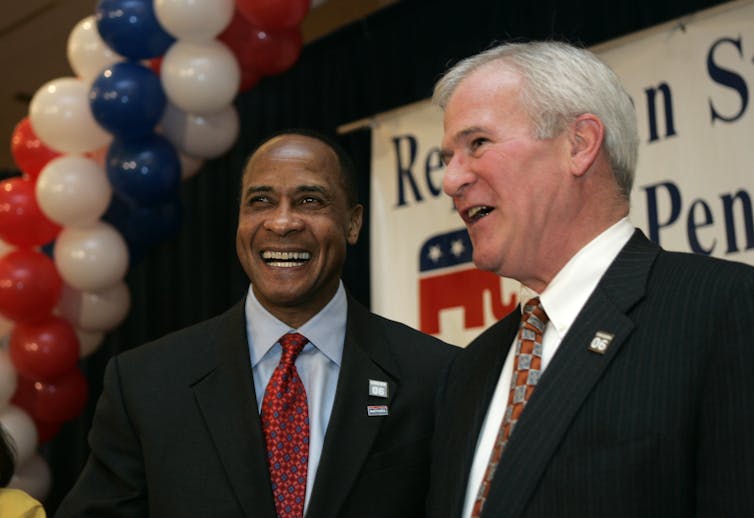AP Photo/Bill Haber
John A. Tures, LaGrange College
Former Georgia General Assembly Minority Leader Stacey Abrams would be a strong candidate for the 2020 U.S. Senate seat.
She’s raised almost twice as much money as U.S. Sen. David Perdue of the Republican Party this year for her PAC. She’s a national figure, giving the response to President Donald Trump’s State of the Union address, the first African American woman to do so. She’s a possible running mate for Joe Biden.
But Abrams has decided not to run for Senate, after her battle for Georgia governor, where she lost by an eyelash against Secretary of State Brian Kemp.
I suspect that I know why. As a political scientist, I have studied African Americans who pursue statewide office.
No African American has ever defeated an incumbent U.S. senator or governor, although 26 have tried and failed, as my colleague Robert Allen and I have discovered while analyzing the data.

Kevin Wolf/AP Images for The Roosevelt Institute
The incumbent problem
Incumbents are hard to beat, but senators and governors are not immune from defeat.
In 2018, 19 governors sought reelection, and three of them lost. If you count Alaska Gov. Bill Walker, an independent who was trailing badly in the polls and dropped out of the race just days before the election, there would be four governors of 20 who lost. Thirty senators ran for reelection, and five were defeated.
So nine of 50 incumbent governors or senators, or 18%, lost in 2018. Compare that to the 0% who have lost against African American candidates.
African Americans fare better when there are open seats for the U.S. senate or governorship. When an African American doesn’t have to run against a sitting incumbent in the Senate or governor’s office, these candidates have won 11 of 33 cases, or 33% of the time.
The question is why.
Seen as liberal or inexperienced
In a study published in 2014, I found that opponents sought to portray all black candidates as extreme liberals. This is perhaps a code for being supportive of spending on welfare, food stamps, racial quotas or policies that would disproportionately help the African American community.
One explicit case came in 1990, when African American candidate Harvey Gantt, the mayor of Charlotte, took on North Carolina Senator Jesse Helms. Trailing in the polls, Helms ran a controversial ad in which a white person held a crumpled job rejection letter. The narrator says the person holding the letter was the most qualified, but the job went to a minority, and tied the rejection to Gantt’s support of affirmative action. The incumbent Helms won another term.
I found that African American candidates with moderate voting records or policy positions receive more votes in their elections for governor or senator.
My 2014 study of African American candidates found that their opponents often sought to portray black candidates as being “inexperienced.” Even in 2012, President Barack Obama was accused by Republicans of being inexperienced – despite having just served a term as president.
In my view, such attacks are used to imply that an African American candidate got ahead in life only by quotas or programs that help only minorities, instead of merit or hard work.
Even though several white candidates have won gubernatorial, senatorial and presidential elections without electoral experience, only one black candidate, Deval Patrick, won a governor or senate race without having run for office before. Patrick was elected governor of Massachusetts in 2006 after serving as a deputy U.S. attorney general. The seat was open after Gov. Mitt Romney chose not to run for another term.

AP Photo/Carolyn Kaster
Advice for future candidates
I think that African American candidates can overcome charges of inexperience most effectively by running first for lower statewide office instead of a mayor or congressional seat.
That’s what Edward Brooke did in Massachusetts, first pursuing the state’s attorney general post, before running for the U.S. Senate in 1966.
Virginia Gov. Doug Wilder ran for lieutenant governor and won first, before going for the state’s highest office.
As The Ohio State University’s Judson Jeffries and Georgia State’s Charles E. Jones point out, blacks need “twice as much experience” as whites to win.
Perhaps Abrams and Andrew Gillum, who narrowly lost his bid to be Florida governor, can run for a similar office as a springboard to a run for the U.S. Senate or governor’s office.
But, at least so far, it’s nearly impossible for an African American candidate to unseat an incumbent in the race for governor or senator.
Robert Allen contributed to this story. He is a 2019 LaGrange College graduate and currently a volunteer with the Peace Corps in Moldova.
[ You’re smart and curious about the world. So are The Conversation’s authors and editors. You can read us daily by subscribing to our newsletter. ]![]()
John A. Tures, Professor of Political Science, LaGrange College
This article is republished from The Conversation under a Creative Commons license. Read the original article.
